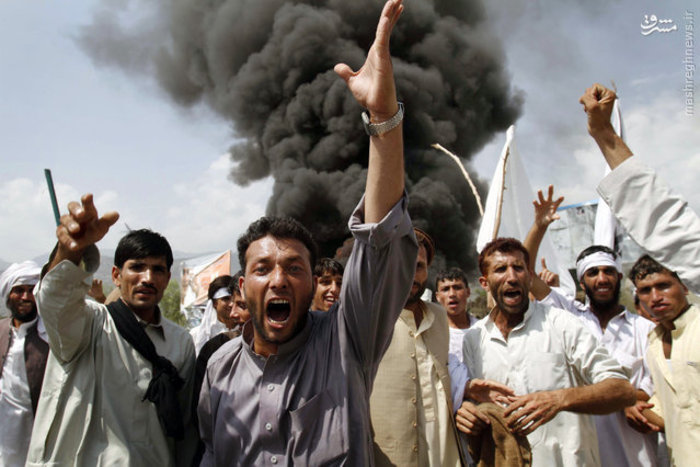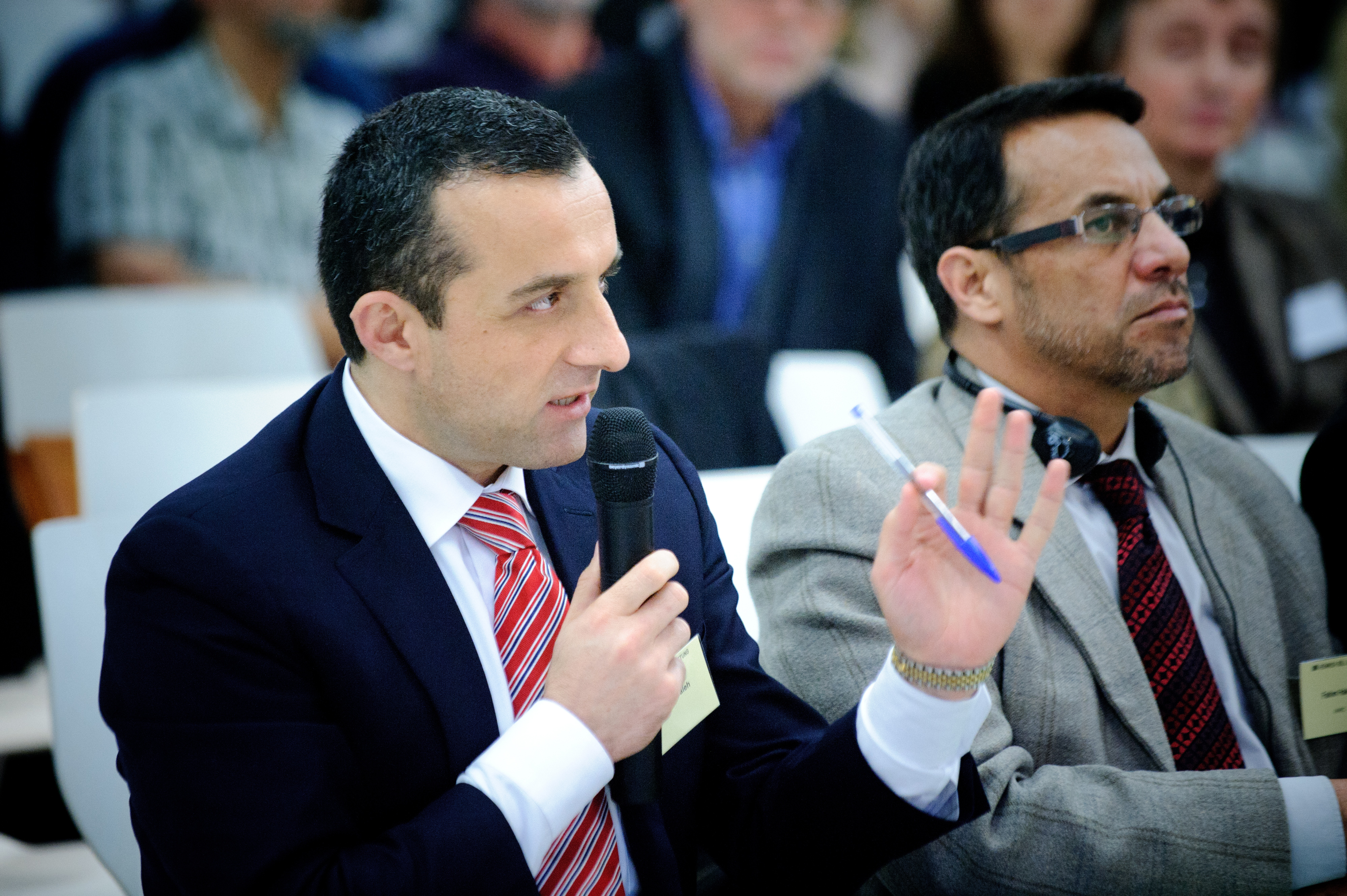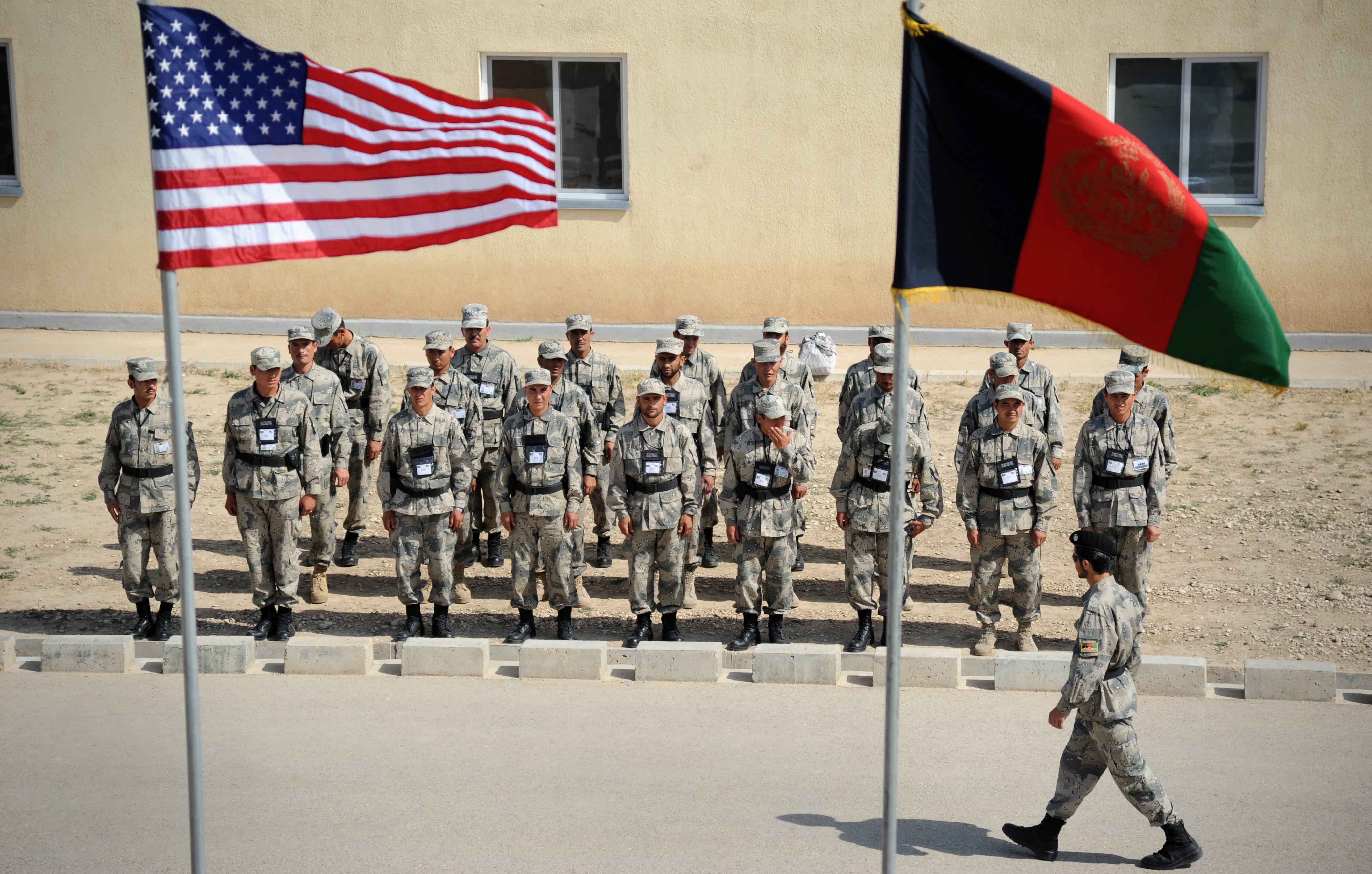|
Dostum
Abdul Rashid Dostum ( ; prs, عبدالرشید دوستم; Uzbek Latin: , Uzbek Cyrillic: , ; born 25 March 1954) is an Afghan exiled politician, former Marshal in the Afghan National Army, founder and leader of the political party Junbish-e Milli. Dostum was a major army commander in the communist government during the Soviet–Afghan War, and in 2001 was the key indigenous ally to US Special Forces and the CIA during the campaign to topple the Taliban government. He is one of the most powerful and notorious warlords since the beginning of the Afghan wars, known for siding with winners during different wars. Born into an ethnic Uzbek peasant family in Jawzjan Province, Dostum joined the People's Democratic Party of Afghanistan (PDPA) as a teenager before enlisting in the Afghan National Army and training as a paratrooper, serving in his native region around Sheberghan. Soon with the start of the Soviet–Afghan War, Dostum commanded a KHAD militia and eventually gained a r ... [...More Info...] [...Related Items...] OR: [Wikipedia] [Google] [Baidu] |
Afghan Civil War (1996–2001)
The 1996–2001 Afghan Civil War took place between the Taliban's Battle of Kabul (1992–1996), conquest of Kabul and their establishing of the Islamic Emirate of Afghanistan (1996–2001), Islamic Emirate of Afghanistan on 27 September 1996, and the United States invasion of Afghanistan, US and UK invasion of Afghanistan on 7 October 2001: a period that was part of the Afghan Civil War (1989–1992), Afghan Civil War that had started in 1989, and also part of the Afghanistan conflict (1978–present), war (in wider sense) in Afghanistan that had started in 1978. The Islamic State of Afghanistan government remained the recognized government of Afghanistan of most of the international community, the Taliban's Islamic Emirate of Afghanistan however received recognition from Saudi Arabia, Pakistan and the United Arab Emirates. The defense minister of the Islamic State of Afghanistan, Ahmad Shah Massoud, created the United Islamic Front for the Salvation of Afghanistan, United Fr ... [...More Info...] [...Related Items...] OR: [Wikipedia] [Google] [Baidu] |
Battles Of Mazar-i-Sharif (1997–1998)
The Battles of Mazar-i-Sharif were a part of the Afghan Civil War and took place in 1997 and 1998 between the forces of Abdul Malik Pahlawan and his Hazara allies, Junbish-e Milli-yi Islami-yi Afghanistan, and the Taliban. Background In early 1992, when the fall of the communist government of Mohammad Najibullah was imminent, formerly communist militias dominated by ethnic Uzbeks (mostly Sunni Muslims) in northern Afghanistan mutinied against Kabul. They were united by general Abdul Rashid Dostum into the National Islamic Movement of Afghanistan (''Junbish-i-Milli Islami Afghanistan''), best known as Junbish. This rebel faction took control of five northern provinces of Afghanistan in early 1992, effectively establishing a warlord state with the city of Mazar-i-Sharif as its capital. Junbish maintained an uneasy alliance with Hezbe Wahdat, a faction of predominantly Shia Muslim Hazaras; there was a large minority of Hazaras living in Mazar at the time. Though initially siding ... [...More Info...] [...Related Items...] OR: [Wikipedia] [Google] [Baidu] |
Junbish-e Milli
The National Islamic Movement of Afghanistan ( prs, جنبش ملی اسلامی افغانستان, ''Junbish-i-Milli Islami Afghanistan''), sometimes called simply Junbish, is a Turkic political party in Afghanistan. Its founder is Marshal Abdul Rashid Dostum who created it in 1992 made from his loyalist remnants from the People's Democratic Party of Afghanistan's communist regime. It has been described as "an organisation heavily peopled with former Communists and Islamists," and is regarded as somewhat secular and left-leaning. Its voter base is mostly Uzbeks, and it is strongest in Jowzjan, Balkh, Faryab, Sar-e Pol, and Samangan provinces. History Formation Junbish and its military wing, Division 53 started as a “self-defense unit” for the Sheberghan oil fields in northern Afghanistan, growing to a platoon and then a company until it grew to a division of about 40,000 men by 1989. This division joined the Afghan government and was referred to as Division 53. In 198 ... [...More Info...] [...Related Items...] OR: [Wikipedia] [Google] [Baidu] |
National Islamic Movement Of Afghanistan
The National Islamic Movement of Afghanistan ( prs, جنبش ملی اسلامی افغانستان, ''Junbish-i-Milli Islami Afghanistan''), sometimes called simply Junbish, is a Turkic political party in Afghanistan. Its founder is Marshal Abdul Rashid Dostum who created it in 1992 made from his loyalist remnants from the People's Democratic Party of Afghanistan's communist regime. It has been described as "an organisation heavily peopled with former Communists and Islamists," and is regarded as somewhat secular and left-leaning. Its voter base is mostly Uzbeks, and it is strongest in Jowzjan, Balkh, Faryab, Sar-e Pol, and Samangan provinces. History Formation Junbish and its military wing, Division 53 started as a “self-defense unit” for the Sheberghan oil fields in northern Afghanistan, growing to a platoon and then a company until it grew to a division of about 40,000 men by 1989. This division joined the Afghan government and was referred to as Division 53. In 19 ... [...More Info...] [...Related Items...] OR: [Wikipedia] [Google] [Baidu] |
United States Invasion Of Afghanistan
In late 2001, the United States and its close allies invaded Afghanistan and toppled the Taliban government. The invasion's aims were to dismantle al-Qaeda, which had executed the September 11 attacks, and to deny it a safe base of operations in Afghanistan by removing the Taliban government from power. The United Kingdom was a key ally of the United States, offering support for military action from the start of invasion preparations. The invasion came after the Afghan Civil War's 1996–2001 phase between the Taliban and the Northern Alliance groups, resulting in the Taliban controlling 80% of the country by 2001. The invasion became the first phase of the 20-year-long War in Afghanistan and marked the beginning of the American-led War on Terror. After the September 11 attacks, US President George W. Bush demanded that the Taliban hand over Osama bin Laden and expel al-Qaeda; bin Laden had already been wanted by the FBI since 1998. The Taliban declined to extradite him a ... [...More Info...] [...Related Items...] OR: [Wikipedia] [Google] [Baidu] |
Battle Of Kabul (1992–1996)
The Battle of Kabul was a series of intermittent battles and sieges over the city of Kabul during the period of 1992–1996. Throughout the Soviet–Afghan War from 1979 to 1989, and subsequent civil war (1989–1992) the city of Kabul saw little fighting. The collapse of Mohammad Najibullah's regime in April 1992 led to a peace treaty between the Afghan political parties and the establishment of the Islamic State of Afghanistan. But soon after, the undisciplined commanders from both former mujahideen and Communist ranks started to vie for power, abetted by foreign powers, namely Pakistan, Saudi Arabia, Iran and Uzbekistan, who began arming their Afghan proxies to fight for control and influence. Political background With the breakup of the Soviet Union in 1991, the Soviet-supported government of Najibullah lost credibility. In 1992, Russia agreed to end fuel shipments to the Democratic Republic of Afghanistan, which triggered the collapse of Najibullah's regime. In April 1992 ... [...More Info...] [...Related Items...] OR: [Wikipedia] [Google] [Baidu] |
Fall Of Mazar-i-Sharif
The fall of Mazar-i-Sharif (or Mazar-e-Sharif) in November 2001 resulted from the first major offensive of the Afghanistan War after American intervention. A push into the city of Mazar-i-Sharif in Balkh Province by the United Islamic Front for the Salvation of Afghanistan (Northern Alliance), combined with U.S. Army Special Forces aerial bombardment, resulted in the withdrawal of Taliban forces who had held the city since 1998. After the fall of outlying villages, and an intensive bombardment, the Taliban and al-Qaeda forces withdrew from the city. Several hundred pro-Taliban fighters were killed. Approximately 500 were captured, and approximately 1,000 reportedly defected. The capture of Mazar-i-Sharif was the first major defeat for the Taliban. Preparation The Taliban captured Mazar-i-Sharif on 8 August 1998 and controlled it thereafter. After taking the city, Taliban fighters committed a massacre against its Shia population. This led to widespread international condem ... [...More Info...] [...Related Items...] OR: [Wikipedia] [Google] [Baidu] |
6th Corps (Afghanistan)
The 6th Corps was a corps (a military formation) of the Afghan Army, seemingly active from 1990 to around 2003–2004. Created as a military formation of the PDPA's standing army, it degraded into a grouping of militias by its last years. Abdul Rashid Dostum had previously commanded the Jozjani militia, which later became the 53rd Infantry Division. Numbering 40,000 men drawn from the Uzbek minority, it took its orders directly from Mohammad Najibullah. It was later termed as the 'only real mobile reserve' available to the regime. After 1989, this force was the only one capable of carrying out offensive operations. The 80th Division was reportedly formed during the Soviet–Afghan War, after 1988. It was originally an Isma'ili-sponsored tribal Sarandoy (Interior Ministry) regiment/brigade. In 1989 it was the major formation in Baghlan Province, under the command of Sayed Jafar Naderi, the then 25-year-old son of Sayed Mansoor Naderi, 53, the religious leader of the minor Isma` ... [...More Info...] [...Related Items...] OR: [Wikipedia] [Google] [Baidu] |
Ashraf Ghani
Mohammad Ashraf Ghani Ahmadzai (born 19 May 1949) is an Afghan politician, academic, and economist who served as the president of Afghanistan from September 2014 until August 2021, when his government was overthrown by the Taliban. Born in Logar Province, Ghani went to the United States in the 1960s to study and later completed a bachelor's degree at the American University in Beirut. After receiving his PhD from Columbia University, he became a professor of anthropology at numerous institutions, mostly at Johns Hopkins University, before starting to work with the World Bank. He returned to Afghanistan in 2002 after the collapse of the Taliban government, serving as the finance minister in Hamid Karzai's cabinet—where he was credited for creating a new afghani currency and a tax system — until his resignation in December 2004 to become the dean of Kabul University. In 2005 he became a member of the Commission on Legal Empowerment of the Poor, an independent initia ... [...More Info...] [...Related Items...] OR: [Wikipedia] [Google] [Baidu] |
Afghanistan
Afghanistan, officially the Islamic Emirate of Afghanistan,; prs, امارت اسلامی افغانستان is a landlocked country located at the crossroads of Central Asia and South Asia. Referred to as the Heart of Asia, it is bordered by Pakistan to the east and south, Iran to the west, Turkmenistan to the northwest, Uzbekistan to the north, Tajikistan to the northeast, and China to the northeast and east. Occupying of land, the country is predominantly mountainous with plains in the north and the southwest, which are separated by the Hindu Kush mountain range. , its population is 40.2 million (officially estimated to be 32.9 million), composed mostly of ethnic Pashtuns, Tajiks, Hazaras, and Uzbeks. Kabul is the country's largest city and serves as its capital. Human habitation in Afghanistan dates back to the Middle Paleolithic era, and the country's Geostrategy, strategic location along the historic Silk Road has led it to being described, pict ... [...More Info...] [...Related Items...] OR: [Wikipedia] [Google] [Baidu] |
Amrullah Saleh
Amrullah Saleh (Pashto/ prs, امرالله صالح, ; born 15 October 1972) is an Afghan politician who served as the first vice president of Afghanistan from February 2020 to August 2021, and acting interior minister from 2018 to 2019. He was the head of the National Directorate of Security (NDS) from 2004 to 2010. A member of the mujahideen during the civil war against Afghanistan's communist government, Saleh later joined Ahmad Shah Massoud's Northern Alliance, an anti-Taliban coalition in the northeast of the country. In 1997, Saleh became the head of the Northern Alliance's liaison office inside the Afghan Embassy in Dushanbe, Tajikistan, handling contacts with international non-governmental organizations and intelligence agencies. As head of the NDS, Saleh directed efforts to infiltrate the Taliban and locate Osama bin Laden. Saleh resigned from the NDS in 2010 amidst worsening relations with President Hamid Karzai, founding Basej-e Milli ("National Movement"), a pr ... [...More Info...] [...Related Items...] OR: [Wikipedia] [Google] [Baidu] |
Jowzjan Province
Jowzjan, sometimes spelled Jawzjan or Jozjan (Dari: ), is one of the thirty-four provinces of Afghanistan, located in the north of the country bordering neighboring Turkmenistan. The province is divided into 11 districts and contains hundreds of villages. It has a population of about 613,481, which is multi-ethnic and mostly agriculturalists. Sheberghan is the capital of Jozjan province. History The province is named after the early medieval region and principality of Juzjan. Between the early 16th century and mid-18th century, the area was ruled by the Khanate of Bukhara. It was conquered by Ahmad Shah Durrani and became part of the Durrani Empire in or about 1750, which formed to the modern state of Afghanistan. The area was untouched by the British during the three Anglo-Afghan wars that were fought in the 19th and 20th centuries. Recent history Following a series of changing allegiances and falling out with Uzbek warlord Abdul Malik Pahlawan in 1997, the Taliban withdrew f ... [...More Info...] [...Related Items...] OR: [Wikipedia] [Google] [Baidu] |






